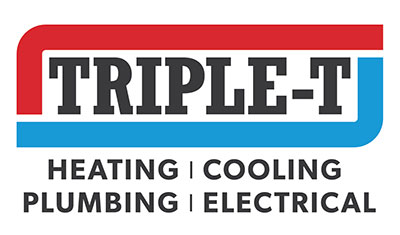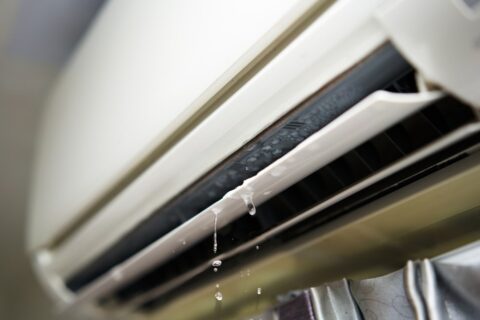What to Do When Your AC System Freezes Up
It may be hot outside, but that doesn’t mean your air conditioner can’t freeze up. In fact, it’s a common occurrence that baffles many Utah homeowners. Here’s what to do if ice has formed on your AC unit. We also have more information about why ice forms and how to prevent this problem in the future.
Frozen Air Conditioner? Here’s What to Do
Ice may form on the evaporator coils, which are located inside near the furnace blower. This is where the ice originates. If you leave the air conditioner operating under these conditions, the ice may spread to the outdoor condensing unit—even if it’s 90 degrees outside! Here’s what to do if you suspect a freezing air conditioner.
Turn Off the Power
Signs of a frozen AC unit include poor airflow and lukewarm air blowing from the vents. If you notice these problems, check both the indoor and outdoor AC components for ice buildup. If you find any, turn off the air conditioner right away to prevent further damage.
It’s important not to run an air conditioner with frozen evaporator coils because this could strain the compressor. As the most expensive component in your cooling system, a broken compressor usually warrants replacing the entire air conditioner. In addition to turning off the AC at the thermostat, it’s also wise to shut off the power at the electrical breaker box just to be safe.
Thaw the Ice
Even in the middle of a heat wave, it could take an entire day for the ice to melt from your air conditioner. Don’t be tempted to chip away at the ice with a sharp or heavy object, as this could damage sensitive cooling components. However, feel free to use a hairdryer, fan, or space heater to speed up the process.
Dry it Out
Once the ice has melted, the air conditioner needs to dry. Pat wet components with a paper towel to remove most of the moisture. Then, restore power to the AC unit and run it in fan-only mode. To do this, set the thermostat higher than the current indoor ambient temperature. Then, set the fan to “on.” This step circulates air around the coils and helps them dry off more quickly.
Call an HVAC Professional
At this point, it’s safe to start using your air conditioner again. The trouble is, unless you solve the underlying problem, your AC is liable to freeze up again. That’s why the final step to take when your air conditioner freezes is to call an HVAC professional and request AC repair. A knowledgeable technician can diagnose the cause and perform the required repair to get your cooling system running reliably again.
What Causes Ice to Form on an Air Conditioner?
Before you can hope to prevent a frozen AC unit, you must understand why ice forms in the first place. It all ties back to the refrigerant, the heart of any air conditioning system, which circulates through copper pipes running between the indoor evaporator coils and the outdoor condensing coils.
The refrigerant enters the evaporator coils fresh from the expansion valve, which puts it in an extremely cold state. Warm indoor air blows over the coils, and the refrigerant inside absorbs heat, leaving cool air to circulate around the house. The refrigerant then flows through the compressor on its way out to the condensing coils, where it exhausts heat to the exterior.
If this process is disrupted, your air conditioner may freeze up. Here are the possible culprits:
- Low airflow: Your HVAC air filter traps airborne debris to help improve indoor air quality, but if you never replace the filter, it will eventually become clogged. This reduces airflow over the evaporator coil and may cause the chilly refrigerant flowing through it to freeze. Anything that prohibits warm air from flowing over the coils can allow the refrigerant to get too cold, including closing too many supply registers and blocking return vents.
- Dirty evaporator coil: Over time, dust, grime, and hair stick to the evaporator coil, impeding the heat transfer process between the air and the refrigerant. It’s all too easy for the refrigerant to freeze under these conditions.
- Refrigerant leak: The refrigerant loop is a closed system, but if a leak develops, it may become undercharged. Without the correct pressure, the coils can become too cold and freeze up. Be aware that only a qualified HVAC technician can repair and recharge a refrigerant system.
How to Prevent an Air Conditioner from Freezing
It’s no fun to deal with a frozen AC unit. If you never want to face this problem again, follow these tips:
- Change the air filter: Depending on what type of filter you have, you may need to replace it as often as every six to eight weeks. An HVAC technician can help you make this determination.
- Schedule routine air conditioning maintenance: Annual AC tune-ups help prevent and repair airflow problems, dirty evaporator coils, and refrigerant leaks so your air conditioner never freezes over.
- Get an airflow inspection: If airflow continues to be a problem—even with a new filter and open air vents throughout the house—an airflow inspection can help you figure out what’s wrong. The problem could stem from undersized ducts, air leaks, or a collapsed section of ductwork somewhere behind your walls.
AC Repair & Maintenance in Utah County & Washington County, UT
It’s frustrating and alarming to find ice on your air conditioner, but rest assured that the problem is repairable and preventable. If you need help getting your AC working like normal again, please contact Triple T Heating, Cooling & Plumbing to request 24/7 air conditioning repair. You can reach us at 801-790-0460 in Utah County or at 435-216-1608 if you live in Washington County.


